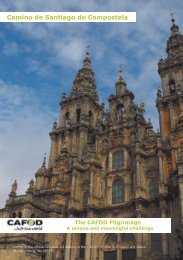Religious Education Curriculum Directory (3-19) - The Catholic ...
Religious Education Curriculum Directory (3-19) - The Catholic ...
Religious Education Curriculum Directory (3-19) - The Catholic ...
- No tags were found...
You also want an ePaper? Increase the reach of your titles
YUMPU automatically turns print PDFs into web optimized ePapers that Google loves.
<strong>Religious</strong> <strong>Education</strong> <strong>Curriculum</strong> <strong>Directory</strong>1.6. THE HOLY SPIRITGod’s Self-Revelation is made perfect in us by the Holy Spirit, the Spirit of truth. This truth waspromised by Jesus and revealed at Pentecost. Through the Holy Spirit people are formed andguided to become God’s people through knowing God. Our pupils are invited to enter into a communionwith God through Jesus Christ.1.6.1. <strong>The</strong> Holy Spirit (683-741)A <strong>The</strong> Third Person of the Trinity: the Holy Spirit,the Lord and giver of life (243-248)a Eternally proceeding from the Father and theSon (687)b Only fully revealed by Jesus (689-690, 727-730)c Sanctifier of the Church and her members,e.g., gifts and fruits of the Holy Spirit (32, 731-741, 1830-1832)B Believing in the Holy Spirit (683-686)a Missions of the Son and the Holy Spirit are in-separable (687-690, 742-743)b Names of the Holy Spirit (691-693)c Symbols used to represent the Holy Spirit (694-701)d <strong>The</strong> Holy Spirit in the Old Testament; speakingthrough the prophets (687-688, 702-710, 743)e John the Baptist (717-720)f Mary (721-726, 744)1.6.2. <strong>The</strong> Holy Spirit in the Church (733-741, 747)A <strong>The</strong> Holy Spirit and Jesus Christ in his earthlymission (727-730, 745-746 )B <strong>The</strong> event of Pentecost (731-732, 738)C <strong>The</strong> Holy Spirit act in the hearts of the faithful(684, 738-741, <strong>19</strong>66)D <strong>The</strong> Holy Spirit and the sacramental economy(1091, 1133, 1670)1.6. REVELATION: APOLOGETICS1.6.1. How can we know God exists?A Even without the Bible and Divine Revelation, wecan know God really exists through reason andthrough experience. (36-39, 50, 156-159)a <strong>The</strong> order and beauty of the natural worldpoint to God as the origin and Creator of theuniverse. (295)b Creation did not happen by chance; through-out history the Church has taught that creationhas a cause, and that cause is God. (156,295)c <strong>The</strong> natural law written upon each person’sheart and the longing for God that each personhas also point to God’s existence. (<strong>19</strong>54-<strong>19</strong>60)B Reason and experience can also teach us to acceptthe word of other believers. (39)a God’s Revelation comes down to us throughScripture and Tradition. (50-53, 74-83)b <strong>The</strong> testimony and witness of others who haveCgone before us: people whose stories appear inthe Bible; Apostles, saints, and martyrs. (823,828, 857, 946, 1258, 2473)c <strong>The</strong> faith of people we know today: the popeand the bishops in union with him; priests anddeacons; parents, grandparents, and otherfamily members; teachers and catechists; thewitness of fellow <strong>Catholic</strong>s as well as the witnessof non-<strong>Catholic</strong> believers. (85, 1655-1658)We can also know God exists through faith. Forthose who do believe, through faith as well asprayer and grace, they can grow in the knowledgeand experience of the reality of God and his existence.(143, 153-159)1.6.2. How can we say that God loves us amidstsuch human suffering (1503-1505, 1681, 1808)?A We say God loves us deeply, even in the midst ofsuffering, because he reveals his love to us inmany ways, especially in Christ’s taking our sufferingupon himself for our sake. (1505)20
















